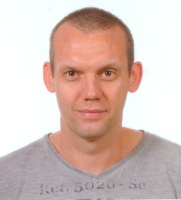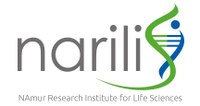Régis Hallez
Research
 MIS project: Regulation of the second messenger (p)ppGpp upon nutrient starvation in Caulobacter crescentus
MIS project: Regulation of the second messenger (p)ppGpp upon nutrient starvation in Caulobacter crescentus
Modulating essential cellular processes in response to fluctuations in nutrient availability is a crucial process for all living cells. However, the underlying molecular mechanisms remain largely unknown, especially in bacteria. Recently, we uncovered the nitrogen-related phosphotransferase system (PTSNtr) as a first mechanism that regulates cell cycle progression upon nitrogen starvation in the a-proteobacterium Caulobacter crescentus. This mechanism allows cells to sense nitrogen – but not carbon – starvation by way of detecting glutamine deprivation, and to trigger accumulation of the alarmone (p)ppGpp. Accumulation of (p)ppGpp in C. crescentus increases the doubling time, the motility, the survival in stationary, the G1 lifetime and the tolerance to bactericidal antibiotics. However, the mechanism(s) targeted by (p)ppGpp and responsible for all these effects remains unknown. In this proposal, we will first further characterize PTSNtr in C. crescentus, notably by checking whether the levels of (p)ppGpp and PTSNtr components oscillate throughout the cell cycle. Then we will combine genetic and biochemical approaches to find actors involved in the (p)ppGpp production upon carbon starvation. Finally, we will characterize the impact of the transcriptional reprogramming in the (p)ppGpp-dependent effects and determine the complete (p)ppGpp transcriptome. Indeed, our preliminary data strongly suggest that the RNA polymerase (RNAP) might constitute the major (p)ppGpp target in C. crescentus. This research could lead to a better understanding of bacterial adaptation to stressful conditions and metabolic constraints, but also to promising perspectives to combat tolerance to bactericidal antibiotics, a phenomenon strongly influenced by (p)ppGpp.
Régis Hallez's NARC fellowship starts on 1 October 2019 for a period of 2 years.
Presentation
Régis Hallez has an expertise in molecular microbiology and bacterial genetics with a particular interest in bacterial cell cycle control, differentiation and stress response. His favorite models are the Gram-negative alpha-proteobacteria Caulobacter crescentus, Sinorhizobium meliloti and Agrobacterium tumefaciens, and the gamma-proteobacteria Escherichia coli and Acinetobacter baumannii.
Short CV:
- Assistant Professor (2019-present) at UNamur: Teacher in the new Master in Molecular Microbiology (MMM)
- Welbio Investigator (2019-present) at UNamur
- FNRS-F.R.S Research Associate (2015-present) at UNamur: Chercheur Qualifié (CQ) FNRS
- Group leader (2013-2015) in Bacterial Cell cycle & Development at UNamur
- FNRS-F.R.S Postdoctoral Fellow (2009-2013) in Bacterial Cell cycle & Development at UNamur: Chargé de Recherche (CR) FNRS
- Postdoctoral Fellow at the University of Basel-Switzerland (2008-2009) in Bacterial Development: EMBO Long Term Fellowship in the lab of Prof. Urs Jenal
- Postdoctoral Fellow at ULB-Belgium (2006-2008) in Bacterial Genetics
- Visit in the Jacobs-Wagner lab at Yale University-USA (2005)
- Master in Sciences (2001) and PhD in Molecular Biology (2006) at UNamur
Contact: Régis Hallez
FNRS TV
Régis Hallez explique pourquoi la multi-résistance aux antibiotiques s’intensifie. Dans le cadre de son projet WELBIO, il cherche à mieux comprendre la réponse au stress des bactéries, notamment face à un traitement antibiotique, de sorte à développer de nouvelles approches thérapeutiques.
Other UNAMUR memberships














